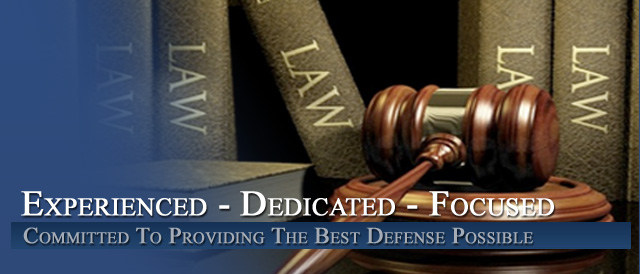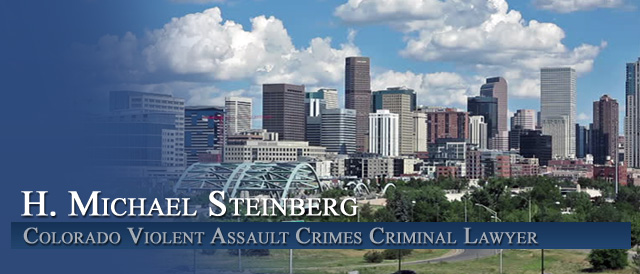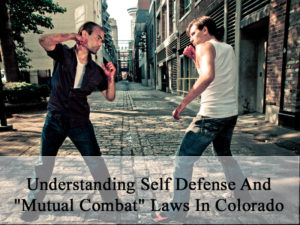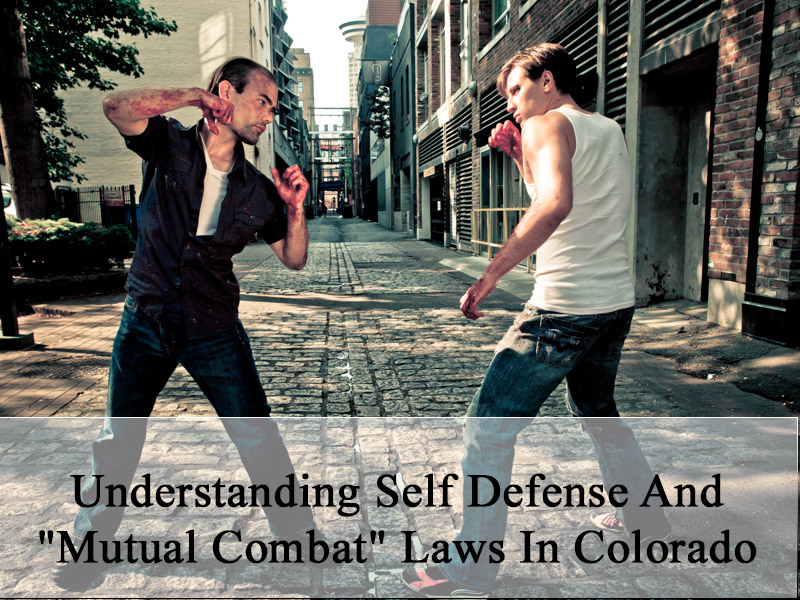





Understanding Self Defense And “Mutual Combat” Laws In Colorado
By H. Michael Steinberg Colorado Violent Crimes Criminal Defense Lawyer
 Understanding Self Defense And “Mutual Combat” Laws In Colorado – Some of the most serious assault based crimes in Colorado can only be defended by asserting the Colorado affirmative defense of self-defense. An exception that impacts the successful use of the defense of self-defense is when the accused engages in what the law calls “combat by agreement” or “mutual combat.”
Understanding Self Defense And “Mutual Combat” Laws In Colorado – Some of the most serious assault based crimes in Colorado can only be defended by asserting the Colorado affirmative defense of self-defense. An exception that impacts the successful use of the defense of self-defense is when the accused engages in what the law calls “combat by agreement” or “mutual combat.”
This article explores the complexities of the combat by agreement exception to the Colorado self defense law.
The following crimes comprise the most serious of Colorado’s assault based crimes:
18-3-202. Assault in the First Degree
1) A person commits the crime of assault in the first degree if:
a. With intent to cause serious bodily injury to another person, he causes serious bodily injury to any person by means of a deadly weapon; or
b. With intent to disfigure another person seriously and permanently, or to destroy, amputate, or disable permanently a member or organ of his body, he causes such an injury to any person; or
c. Under circumstances manifesting extreme indifference to the value of human life, he knowingly engages in conduct which creates a grave risk of death to another person, and thereby causes serious bodily injury to any person;
18-3-203. Assault in the Second Degree
(1) A person commits the crime of assault in the second degree if:
…
b. With intent to cause bodily injury to another person, he or she causes such injury to any person by means of a deadly weapon; or
c. With intent to prevent one whom he or she knows, or should know, to be a peace officer, firefighter, emergency medical care provider or emergency medical service provider from performing a lawful duty, he or she intentionally causes bodily injury to any person; or
d. He/she recklessly causes serious bodily injury to another person by means of a deadly weapon; or
e. For a purpose other than lawful medical or therapeutic treatment, he or she intentionally causes stupor, unconsciousness, or other physical or mental impairment or injury to another person by administering to him or her, without his or her consent, a drug, substance, or preparation capable of producing the intended harm; or
g. With intent to cause bodily injury to another person, he or she causes serious bodily injury to that person or another.
18-3-204. Assault in the Third Degree
A person commits the crime of assault in the third degree if the person knowingly or recklessly causes bodily injury to another person or with criminal negligence the person causes bodily injury to another person by means of a deadly weapon. Assault in the third degree is a class 1 misdemeanor.
The Colorado Law Of Self Defense Contains THREE Exceptions That STOP The Use Of The Defense At Trial
The Colorado law of self defense appears below in full. Section (3) of 18-1-704 (Use Of Physical Force In Defense Of A Person) provides for three exceptions to the right to self defense. They are:
[The Provocation Exception]
(a.) With intent to cause bodily injury or death to another person, he provokes the use of unlawful physical force by that other person; or
[The Initial Aggressor Exception]
(b.) He is the initial aggressor, except that his use of physical force upon another person under the circumstances is justifiable if he withdraws from the encounter and effectively communicates to the other person his intent to do so, but the latter nevertheless continues or threatens the use of unlawful physical force; or
[The Combat By Agreement Exception]
(c.) The physical force involved is the product of a combat by agreement not specifically
Colorado case law makes clear that there must be a definite agreement before a court can instruct a jury on the mutual combat limitation on self-defense.
Combat By Agreement – Defined
While Colorado’s self-defense statute does not define ‘combat by agreement,’ the definition is present in Colorado appellate cases interpreting the exception.
Before a judge will instruct a jury in a violent crime trial on the exception to self defense known as mutual combat thus potentially denying the accused of his right to a determination beyond a reasonable doubt as to whether he acted in self-defense.
In a nutshell, before the Prosecution can establish a “mutual combat” situation he or she must prove that an agreement to fight existed between the parties, and that the parties entered into the agreement before beginning combat.
Mutual combat does not exist purely because the parties engage in a fist fight.
For example – if a person is initially attacked by a defendant in the bathroom of a bar and the parties are ordered to “take the fight outside.” A fight outside that later ensues is not necessarily mutual combat because there is no “clear-cut agreement” to fight.
The fact that they went outside, in the absence of a “more definite agreement” may not be mutual combat:
“Ordinarily the defense of self-defense in strictly mutual combat is not allowable, but a limitation on the right of self-defense does not arise alone from the fact that the two parties here were mutually engaged in a … fight. An agreement to combat and finish their troubles must exist and must be in the nature of an antecedent agreement to so fight.”
Another example – if there is sufficient evidence in an assault type trial that a fight arose between two people who have a known history of violent altercations, than an “an implied agreement to fight” may exist based on that history.
The Components Of Mutual Combat
A clear-cut agreement to fight might exist when:
1. There is a history of previous altercations
2. There is a general intent to engage in conflict.
3. There is a clear invitation to fight followed by an acceptance, verbal or otherwise.
4. There is a general follow-up of aggression.
An analogy to a contract is not far from this kind of definition. Colorado case law makes it clear that there must be a definite agreement to fight before a Judge can instruct a jury on the mutual combat limitation on self-defense.
If the Colorado District Attorney can present evidence that the Defendant participated in an unauthorized “combat by agreement” – that evidence will then disqualify him from asserting self defense just as the other exceptions – “the provocation exception” – and the “initial aggressor exception” are also exceptions to the affirmative defense of self-defense.
Distinguishing Colorado “Toughperson” Fighting
Colorado criminal law also provides a place for sanctioned (lawful) and unsanctioned (unlawful) forms of fighting
Colorado Section 12-10-103(15), C.R.S. defines “toughperson fighting” as including nearly all types of combat by agreement, other than sanctioned boxing and martial arts training that is conducted in specified circumstances.
Under Colorado law Section 12-10-107.5, C.R.S. if you are convicted of unlawful “tough person fighting” you are punished for a class one misdemeanor (up to 18 months in county jail and up to a $5,000.00 fine.
Another law Section 18-9-106(1)(d), C.R.S. is the much more common charge – the Colorado crime of Disorderly Conduct. Disorderly Conduct is a class three misdemeanor and makes it unlawful to engage in public fighting, other than in an amateur or professional contest of athletic skill);
Finally Section 18-13-104, C.R.S. the Colorado “dueling statute” prohibits:
(1) agreements to fight in a public place, except in sporting events authorized by law; and
(2) agreements to engage in a fight with deadly weapons, whether in a public or private place.
Important Definitions In this Area Are:
§ 12-10-103. Definitions
(1) “Boxer” means an individual who participates in a boxing match.
(2) “‘Boxing” means fighting, striking, forcing an opponent to submit, or disabling an opponent, including the disciplines of kickboxing, mixed martial arts, and martial arts.
(3) “Commission” means the Colorado combative sports commission created in section 12-10-105.
(4) “Contest” means a match in which the participants strive earnestly to win.
(5) “Department” means the department of regulatory agencies.
(6) “Director”, “director of the division”, or “director of the division of professions and occupations” means the director of the division of professions and occupations within the department or his or her designee.
(6.5) “Division” means the division of professions and occupations within the department.
(7) “Exhibition” means a match in which the participants display their boxing skills and techniques without striving earnestly to win.
(9) “Kickboxing” means engaging in martial arts fighting techniques using the hands and feet, the object of which is to win by a decision, knockout, or technical knockout.
(9.5) “Martial arts” means any of several arts of combat or self-defense that are widely practiced as sport.
(10) “Match” means a professional boxing contest or exhibition, the object of which is to win by a decision, knockout, or technical knockout, and includes an event, engagement, sparring or practice session, show, or program where the public is admitted and there is intended to be physical contact. “Match” does not include a training or practice session when no admission is charged.
(10.5) “Mixed martial arts” means the combined techniques of boxing and martial arts disciplines such as grappling, kicking, and striking, including the use of full, unrestrained physical force.
(11) “Office” means the office of combative sports created in section 12-10-104.
(11.5) “Office director” means the director of the office of combative sports created in section 12-10-104.
(12) “Participant” means a person who engages in a match as a boxing contestant.
(13) “Physician” means an individual licensed to practice medicine pursuant to article 36 of this title.
(13.5) “Place of training” means a facility where alcohol beverages are not permitted, an admission fee is not charged for nonstudents, instructors of particular disciplines train students in the art of boxing, and students pay a fee to be enrolled in classes and receive instruction.
(14) “Professional” means a participant who has received or competed for a purse or any other thing of value for participating in a match.
(15) (a) “Toughperson fighting” means:
(I) A physical contest, match, tournament, exhibition, or bout, or any activity that involves physical contact between two or more individuals engaging in combative skills using the hands, feet, or body, whether or not prizes or purses are awarded at the event or promised in future events or spectator admission fees are charged or received; and
(II) The A contest, match, tournament, exhibition, bout, or activity, as described in subsection (15)(a)(I) of this section, that is not recognized by and not sanctioned by any state, regional, or national boxing sanctioning authority that is recognized by the director.
(b) “Toughperson fighting” does not mean:
(I) Activities occurring under a martial arts instructor at a place of training or other types of instructor-student or student-student contact occurring under the supervision of an instructor at a place of training; or
(II) A sanctioned boxing event approved by the commission.
Finally, The Colorado Crime of Disorderly Conduct
§ 18-9-106. Disorderly Conduct
(1) A person commits disorderly conduct if he or she intentionally, knowingly, or recklessly:
(a) Makes a coarse and obviously offensive utterance, gesture, or display in a public place and the utterance, gesture, or display tends to incite an immediate breach of the peace; or
….
(c) Makes unreasonable noise in a public place or near a private residence that he has no right to occupy; or
(d) Fights with another in a public place except in an amateur or professional contest of athletic skill; or
(e) Not being a peace officer, discharges a firearm in a public place except when engaged in lawful target practice or hunting or the ritual discharge of blank ammunition cartridges as an attendee at a funeral for a deceased person who was a veteran of the armed forces of the United States; or
(f) Not being a peace officer, displays a deadly weapon, displays any article used or fashioned in a manner to cause a person to reasonably believe that the article is a deadly weapon, or represents verbally or otherwise that he or she is armed with a deadly weapon in a public place in a manner calculated to alarm.
…
(3) (a) An offense under paragraph (a) or (c) of subsection (1) of this section is a class 1 petty offense; except that, if the offense is committed with intent to disrupt, impair, or interfere with a funeral, or with intent to cause severe emotional distress to a person attending a funeral, it is a class 2 misdemeanor.
(b) An offense under paragraph (d) of subsection (1) of this section is a class 3 misdemeanor.
(c) An offense under paragraph (e) or (f) of subsection (1) of this section is a class 2 misdemeanor.
What follows is the Colorado Law Of Self Defense
18-1-704 Use Of Physical Force In Defense Of A Person
1. Except as provided in subsections (2) and (3) of this section, a person is justified in using physical force upon another person in order to defend himself or a third person in order to defend himself or a third person from what he reasonably believes to be the use or imminent use of unlawful physical force by that other person, and he may use a degree of force which he reasonably believes to be necessary for that purpose.
2. Deadly physical force may be used only if a person reasonably believes a lesser degree of force is inadequate and:
(a.) The actor has reasonable ground to believe, and does believe, that he or another person is in imminent danger of being killed or of receiving great bodily injury; or
(b.) The other person is using or reasonably appears about to use physical force against an occupant of a dwelling or business establishment while committing or attempting to commit burglary as defined in sections 18-4-202 to 18-4-204; or
(c.) The other person is committing or reasonably appears about to commit kidnapping as defined in section 18-3-301 or 18-3-302, robbery as defined in section 18-4-301 or 18-4-302, sexual assault as set forth in section 18-3-402 or 18-3-403 as it existed prior to July 1, 2000, or assault as defined in sections 18-3-202 or 18-3-203.
3. Notwithstanding the provisions of subsection (1) of this section, a person is not justified in using physical force if:
(a.) With intent to cause bodily injury or death to another person, he provokes the use of unlawful physical force by that other person; or
(b.) He is the initial aggressor, except that his use of physical force upon another person under the circumstances is justifiable if he withdraws from the encounter and effectively communicates to the other person his intent to do so, but the latter nevertheless continues or threatens the use of unlawful physical force; or
(c.) The physical force involved is the product of a combat by agreement not specifically authorized by law.
Understanding Self Defense And “Mutual Combat” Laws In Colorado
If you found any of the information I have provided on this web page article helpful please click my Plus+1 or the Share buttons for Twitter and Facebook below so that others may also find it.
The reader is admonished that Colorado criminal law, like criminal law in every state and at the Federal level, changes constantly. The article appearing above was accurate at the time it was drafted but it cannot account for changes occurring after it was uploaded.
If, after reading this article, you have questions about your case and would like to consider retaining our law firm, we invite you to contact us at the Steinberg Colorado Criminal Defense Law Firm – 303-627-7777.
Never stop fighting – never stop believing in yourself and your right to due process of law. You will not be alone in court, H. Michael will be at your side every step of the way – advocating for justice and the best possible result in your case. H. Michael Steinberg is passionate about criminal defense. His extensive knowledge and experience of Colorado Criminal Law gives him the edge you need to properly handle your case
 ABOUT THE AUTHOR: H. Michael Steinberg – Email The Author at:
ABOUT THE AUTHOR: H. Michael Steinberg – Email The Author at:
A Denver Colorado Criminal Defense Lawyer – or call his office at 303-627-7777 during business hours – or call his cell if you cannot wait and need his immediate assistance – please call 720-220-2277.
“A good criminal defense lawyer is someone who devotes themselves to their client’s case from beginning to end, always realizing that this case is the most important thing in that client’s life.”
You should be careful to make a responsible choice in selecting a Colorado Criminal Defense Lawyer. We encourage you to “vet” our firm. Over the last 30 plus years – by focusing ONLY on Colorado criminal law – H. Michael has had the necessary time to commit to the task of constantly updating himself on nearly every area of criminal law, to include Colorado criminal law and procedure and trial and courtroom practice. H. Michael works hard to get his clients the best possible results in and out of the courtroom. He has written, and continues to write, extensively on Colorado criminal law and he hopes this article helps you in some small way – Understanding Self Defense And “Mutual Combat” Laws In Colorado.

Other Articles of Interest:
- Understanding The Fight – Mutual Combat – And Colorado Self Defense Law
- Understanding Colorado Law – If You Start A Fight – You May Not Be Allowed To Claim Self Defense
- Self Defense Law In Colorado 18-1-704 – Do I Have To Run? – The Duty To Retreat Issue
- Colorado Self Defense Law – When Innocent Third Parties Are Injured
- Colorado Felony and Misdemeanor Sentencing Chart












